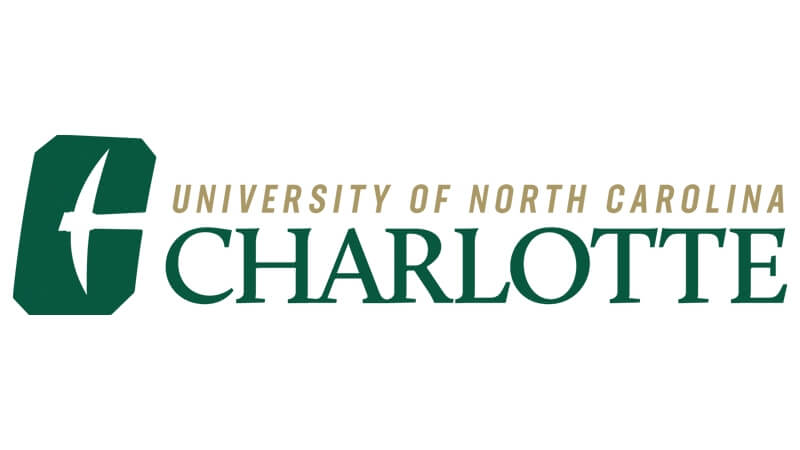Research-intensive universities offer major benefits to graduate students. They are prestigious and backed by substantial funding, home to some of the brightest minds in the field and its most impactful breakthroughs. Equipment, laboratories, and libraries are cutting-edge, with no shortage of opportunities to publish in academic journals, present at conferences, and connect with future employers. For a graduate student, all of this means one thing: a great ROI for all the time, money, and effort invested. UNC Charlotte, projected to achieve Carnegie R1 status in early 2025, is that kind of research-intensive university. The Carnegie designation is awarded to the US’s preeminent public research universities with “very high research activity.” In the past decade, UNC Charlotte’s research expenditures have risen 272% and in October 2023, it had the largest expansion of research centres in its history.
This Top 100 university’s (US News & World Report) has state of art facilities, scholarships, and funded research to support students and faculty. The William States Lee College of Engineering is home to four global research centres, and its faculty are internationally recognised, holding awards from the National Institute of Standards and Technology, National Science Foundation, National Institutes of Health, Fulbright, and more.
Research centres with global impact
Charlotte’s globally focused research centres are solving the problems of tomorrow and supporting graduate student education. Our region has more than 250 energy corporations, including Duke Energy, Siemens, Framatome, Westinghouse, and the Electric Power Research Institute (EPRI). The Energy Production and Infrastructure Centre (EPIC) is working to meet the needs of these organizations through the expansion of energy engineering studies in our classrooms and through the energy concentration.

Adeniyi Adeleke earned his bachelor’s degree in Nigeria before pursuing a Master’s in Mechanical Engineering at UNC Charlotte. Source: UNC Charlotte
Over at the Centre for Precision Metrology (CPM), experts are focusing on the research, development and application of precision metrology, or the science of measurement, for advanced manufacturing that addresses real-world industrial concerns.
As a master’s student at the college, Adeniyi Adeleke received support through a research assistant position at the CPM. Here, he amassed technical understanding and measurement experience, including Geometric Dimensioning & Tolerancing principles, Coordinate Measurement Machine and X-ray CT knowledge and experience collaborating with cross-disciplinary teams. By documenting how he used the Zeiss Duramax Coordinates Measurement Machine for the inspection of critical features in a manufactured part Adeniyi was awarded the ZEISS Academic Scholarship.
Adeleke graduated this year and was immediately hired as a process engineer at a leading technology company. “I aim to become a leader in the field of metrology, participating in technical committees and making significant contributions to the advancement of industrial practices and standards,” he says.
Building on the legacy of innovation at these centres, the college recently launched The Charlotte Aviation Innovation and Research Institute (Charlotte AIR) and The North Carolina Battery Complexity, Autonomous Vehicle and Electrification Research Centre (BATT CAVE). Charlotte AIR is the first partnership of its kind in the US, pairing a major airport with a major university to position Charlotte faculty and students at the forefront of research and innovation in the aviation infrastructure industry. With over 45 million travellers per year, Charlotte’s airport is one of the world’s busiest hubs. The airport is a living lab for students with customised curriculum, unique research opportunities, and experiential training for students.
The BATT CAVE is another pioneer. It is the first and only university-led centre in North Carolina dedicated to advancing battery technology. This is where researchers explore new materials, challenge fundamental electrochemical theories, and develop mechanistic models to create alternative battery types. Their work could have a big impact on the future of autonomous vehicles, smart cities, and intelligent systems.
Each of these research centres drives initiatives that have a global impact. The best part? Paid graduate positions with tuition support are offered at all these research centres.

During Felix Ekuful’s internship at the Oak Ridge National Laboratory, he got to apply theoretical knowledge to real-world scenarios, analysing the cost-effectiveness and impact of various energy-saving strategies. Source: UNC Charlotte
Industry experience through research and internships
The W.S. Lee College of Engineering knows the value of real-world experience. Seventy percent of faculty members worked in industry, making for a highly connected, high-impact academic community. In classrooms, they bring a wealth of practical knowledge and problem-solving skills to the classroom. Beyond campus, they link you to valuable connections and hard-to-come-by mentorship opportunities in industry – both of which serve as a way to showcase your research and enhance your career prospects.
The college’s vast number of partners enables even more exposure and engagement with the industry. With over 300 collaborations with international, national, and regional organisations, students engage in various research projects, internships, seminars, and course instruction that connect classroom learning to real-world applications.
Take Felix Ekuful, for example. He is a master’s student in the Construction and Facilities Engineering programme who interned at the Oak Ridge National Laboratory, the US Department of Energy’s only facility dedicated to performing early-stage research and development in building technologies. “My internship allowed me to apply theoretical knowledge to real-world scenarios, analysing the cost-effectiveness and impact of various energy-saving strategies,” the student from Ghana says.“It allowed me to contribute to cutting-edge research to improve building energy efficiency and sustainability.”
Since joining the college, Ekuful has made the most of UNC Charlotte’s many opportunities that transform students into future leaders in the field of construction and facilities engineering. Backing him is a supportive academic community, while real-world experiences like this internship and winning the national “You and Me, Carbon Free!” competition are bringing him closer to leading advancements in sustainable building technologies. “My career goal is to lead the way in enhancing energy efficiency of buildings through innovative research and sustainable practices,” he says.
This close link between academia, research and industry ensures that graduates are supported during their education and are ready for the demands of the real world.
Interested? Apply to UNC Charlotte’s Engineering programmes today.













